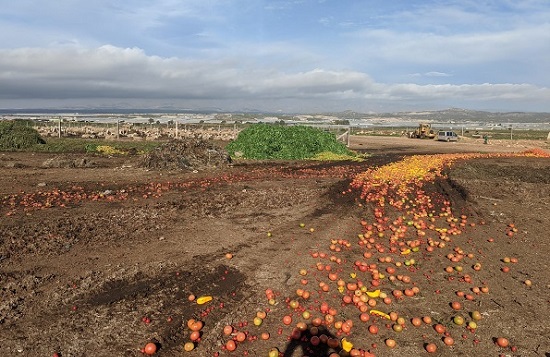News
UA study published in Nature Food calculates the environmental cost of throwing vegetables away
UA study published in Nature Food calculates the environmental cost of throwing vegetables away

This practice means a yearly waste of 300,000 m3 ;of water, over 136 tons of fertilizers and an emission of 7,500 tons of CO2
Researchers at the University of Alicante Ramón Margalef Multidisciplinary Institute for Environmental Research (IMEM) have just published an article in the prestigious scientific journal Nature Food about the environmental cost of throwing away vegetables. Despite the fact that this practice is common and legal, throwing away products such as tomatoes, zucchini or cucumbers leads to significant losses of water, fertilisers and energy. As explained by the lead author of the article "Discarded food and resource depletion" and researcher at the University of Alicante Jaime Martinez Valderrama, in 2019, only in the province of Almeria, 300,000 m3 of water and over 136 tons of fertilisers were wasted, and the emission of equivalent 7,500 tons of CO2 could have avoided by growing almost 13,000 tons of fruit and vegetable products that were never sold.
The study focuses on one of the most arid areas of Europe, Almeria, where an unprecedented agricultural development in this province in the last 40 years places it at the head of national economies. This economic growth has a very high environmental cost in a place where the level of aquifers has dropped to become saline as a result of marine intrusion, the UA researcher warned.
In the study, the University of Alicante research group highlights the amount of resources that are wasted to produce food that does not even enter the commercial circuit. According to the article, more than a third of the food produced worldwide is not consumed and approximately 14% of this third part corresponds to the partial destruction of crops. According to Martínez Valderrama, in most high-income countries, food waste is carried out as an action to control prices which, due to an excess of products in the market, can fall below production costs. It is important to clarify that not all of these vegetables go directly into the rubbish and a significant proportion goes into food banks or is used to feed livestock.
In the case of Almería, discarding food produced with so much effort in a territory with very limited water resources can have consequences for the sector. It should not be overlooked that water, a fundamental resource, is being depleted at an alarming rate in a very dry area where the effects of climate change are expected to be significant, the study's lead author stated.
Methodology
The methodology used by the UA researchers to carry out this work consisted of calculations using technical coefficients and the quantities of product withdrawn according to data collected by the Spanish Agricultural Guarantee Fund (FEGA). As Jaime Martínez Valderrama explained, knowing the annual amount that has been withdrawn from a crop, it is easy to calculate how much water has been wasted through the cubic metres needed to produce a tonne. In the same way, we have proceeded to calculate the amount of fertilisers and the equivalent CO2 emissions that could have been avoided. The team of experts made these calculations for the main vegetables produced in the province of Almeria: tomatoes, cucumbers, courgettes, aubergines and peppers.
Among the solutions proposed by the team of experts at the UA Ramón Margalef Multidisciplinary Institute for Environmental Research in the article to guarantee the sustainability of the agricultural activity in the face of the depletion of water resources are: market regulation, containment of the irrigated area and the price of the products. "If laws regulating water use are enforced and farmers receive a fairer price for their products, we probably shouldn't dispose of the commodity in this environmentally unsound and ethically unsustainable way", Martínez Valderrama said.
BIODESERT Project
This study is part of the BIODESERT Project funded by the Research European Council, led by distinguished researcher Fernando T. Maestre, from the University of Alicante. BIODESERT assesses how human actions derived from grazing or agriculture, and climate change affect arid areas around the world.
In reference to the article published in Nature Food on food waste and resource depletion, Maestre pointed out that it is a really important issue both from an environmental point of view, due to water consumption and the emission of greenhouse gases, and from an ethical, economic and social point of view in a world where there are more than 800 million people suffering from hunger.
Reference:
"Discarded food and resource depletion", Martínez-Valderrama, J., Guirado, E., Maestre, F.T. Nature Food, 2020. DOI: 10.1038/s43016-020-00186-5